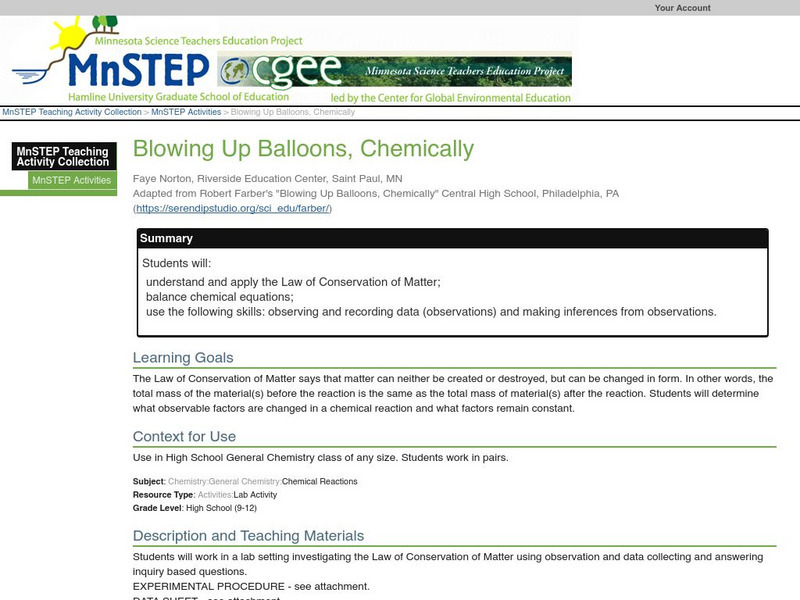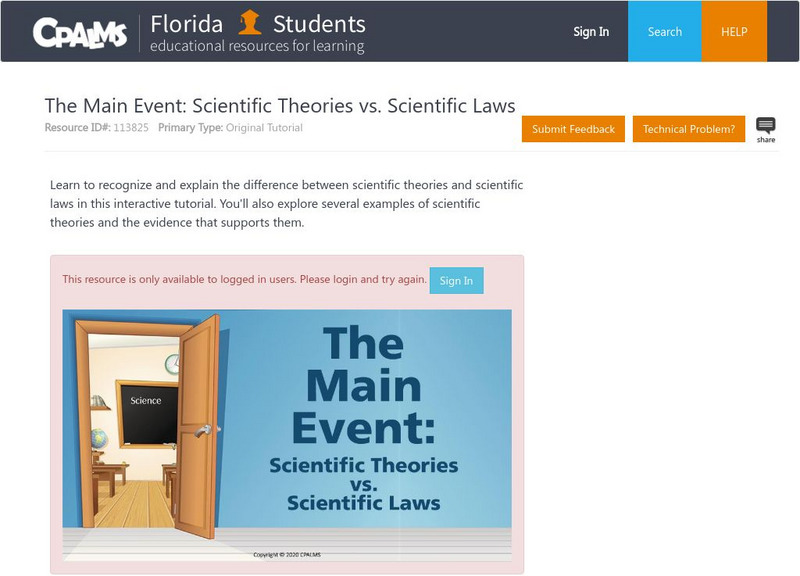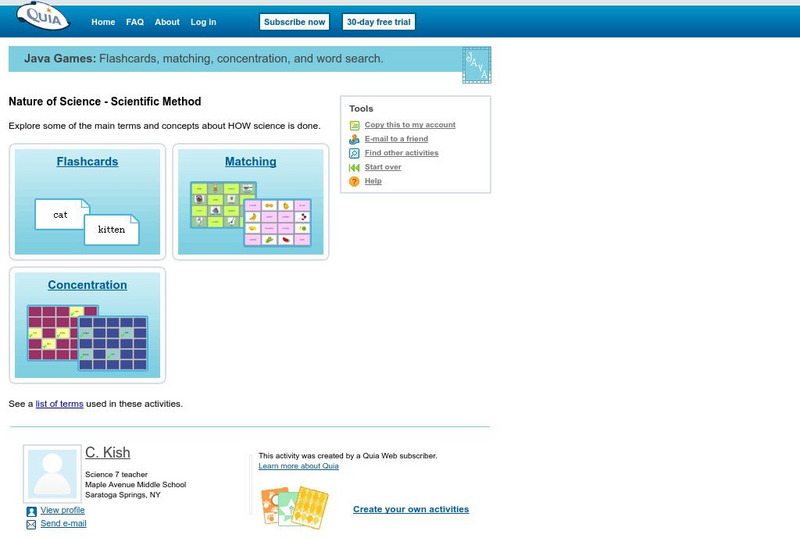Smithsonian Institution
Smithsonian Learning Lab: Every Picture Has a Story
Smithsonian Education presents "Every Picture Has a Story". Teachers can download this comprehensive teaching package in which students examine some of the millions of photographs in the Smithsonian. This amazing teaching package comes...
Science Education Resource Center at Carleton College
Serc: Investigating South Crow River: Discharge, Turbidity, Erosion, Sediments
In this field investigation, small groups of students will observe and measure characteristics of the South Crow River near Mayer, Minnesota. Data collection on these characteristics will include but not be limited to: speed of current...
National Institutes of Health
Alcohol: Separating Fact From Fiction
Students can use this site to observe the effects of alcohol on mice and discuss the ways in which alcohol harms and impairs the body. An online instructional activity, "Alcohol; Separating Fact From Fiction," has students watch video...
Texas Education Agency
Texas Gateway: Question and Purpose
This tutorial reviews over making observations to form questions and purpose for a lab experiment.
Science Education Resource Center at Carleton College
Serc: Blowing Up Balloons, Chemically
Students will understand and apply the Law of Conservation of Matter; balance chemical equations; use the following skills: observing and recording data (observations) and making inferences from observations.
Science Education Resource Center at Carleton College
Serc: Boiling Water With Ice: Effect of Pressure on the Boiling Point of Water
In this activity, which is a discrepant event with guided inquiry, the teacher will go through the steps of boiling water with ice. Through the students telling and recording WHAT is happening, the teacher is showing the students what...
Science Education Resource Center at Carleton College
Serc: Floating Foods and Underwater Eruptions: An Exploration of Density
Young scholars explore the concept of density by investigating how several solids and liquids interact. Through hands-on activities and a teacher demonstration, they develop a greater understanding of density by using their observational...
Polk Brothers Foundation Center for Urban Education at DePaul University
De Paul University: Center for Urban Education: Mousie [Pdf]
"Mousie" is a one page, fictional, reading passage about a boy who caught, tamed, and learned about mice using a scientific method. It is followed by constructed-response questions which require students to provide evidence from the...
PBS
Pbs Teachers: Dead Men's Tales: Splatter Spread
Emulate the work of a forensic scientist by observing the relationship between scatter and distance. Assemble a projectile-hurling device called a potato cannon and analyze the spread pattern of paint soaked projectiles.
Alabama Learning Exchange
Alex: Mystery Powder Investigation
During this lesson, students will work individually to identify a mystery powder. Students will have the opportunity to test known powders with different substances and record observations. Students will develop a plan that can be used...
National Endowment for the Humanities
Neh: Edsit Ement: Fable and Trickster Tales Around the World
The lessons presented in this website "introduce children to folk tales" and how these folktales are changed and affected by generational and cultural values. Includes several links to further related information on folktales, fables,...
Other
Catching Sunshine
Teachers can enroll their class in this online 'Science-athon.' Students design and build a solar collector, and over a period of several days, collect data and enter it into an online database.
Science Education Resource Center at Carleton College
Serc: Investigating the Difference in Geology
For this inquiry based field investigation, students will be observing our school campus's topography, soil, and plants and comparing them with the Fertile sand dunes' topography, soil, and plants. They will make detailed observations...
University of California
University of California at Berkeley: Understanding Science: Mystery Boxes
An interesting lesson where students collaborate to create a visual image of what the inside of a sealed box looks like. The box has a marble or other type of sphere inside it, as well as partitions and/or ramps. Students come to...
Science Education Resource Center at Carleton College
Serc: How Old Is That Thing on That Rock?
Students using magnifying glasses to observe collected fossils, and then make inferences and hypotheses about the age of the specimens.
Science Education Resource Center at Carleton College
Serc: Igneous Rocks Model
Students use samples of four different types of igneous rocks to observe differences in texture, color, and grain size, and then make inferences about the relative cooling histories and silica content associated with each magma type.
PBS
Pbs Teachers: Scientific American: Deep Crisis: Salmon Counting
In this lesson, students can explore the techniques of census and population counting by inferring numbers of a virtual population illustrated within a rectangular sampling grid, and observing the accuracy of the technique in relation to...
Texas Education Agency
Texas Gateway: Descriptive vs. Comparative Investigations
In the following lesson students will learn the differences between descriptive and comparative investigations.
McREL International
Mc Rel: Glue Polymer (Whelmer #15 Learning Activity)
An easy to do activity that investigates the basic principles behind chemical bonding. The activity is written in lesson plan format that meets NSES standards.
National Endowment for the Humanities
Neh: Edsit Ement: Emily Dickinson & Poetic Imagination: "Leap, Plashless"
This lesson introduces students to Emily Dickinson's poetry which often reveals a child-like fascination with the natural world. Students examine how she writes perceptively of butterflies, birds, and bats and uses lucid metaphors to...
CPALMS
Florida State University Cpalms: Florida Students: Scientific Laws and Theories
Differentiate between scientific laws and theories. Identify examples of scientific theories and use evidence to support them.
Quia
Quia: Nature of Science Scientific Method Concentration
Play a game of concentration by matching terms used in the scientific method to their proper description.
Quia
Quia: Nature of Science Scientific Method Flashcards
Review the nature of science with on-line flash cards.
Quia
Quia: Nature of Science
Find games and flashcards that students can use to learn the words associated with the scientific method.





















